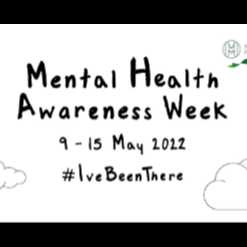
Mental Health Awareness Week
This year’s Mental Health Awareness Week runs from Monday 9th May to Sunday 15th
The Mental Health Foundation started the event 21 years ago and it has become an annual event for the whole of the UK to focus on achieving good mental health.
Each year the Foundation sets a theme, and this year’s theme is Loneliness.
Loneliness had a huge impact on both our physical and mental health during the pandemic and has been affecting more and more of us in the UK and around the world.
Reducing loneliness is a major step towards creating a mentally healthy society, so the theme for this year’s Mental Health Awareness Week is aimed at raising awareness of the impact of loneliness on our mental wellbeing and the practical steps we can take to address it.
Here are some links to the Mental Health Foundation and some other companies who can offer help and advice
https://www.mentalhealth.org.uk/campaigns/mental-health-awareness-week
https://www.mind.org.uk/get-involved/mental-health-awareness-week/
https://mentalhealth-uk.org/get-involved/mental-health-awareness-days/mental-health-awareness-week/
Mental Health isn’t just an issue for adults, children can suffer from it too. These resources from Twinkl can help with raising the awareness in children and help children understand about their own mental health.
https://www.twinkl.co.uk/event/mental-health-awareness-week-2022
How can I promote mental health awareness?
You might be wondering whether one person’s efforts can really make a difference, and the answer is “Yes, absolutely!” Every conversation you have about the importance of recognising and treating mental illness creates a ripple effect that reaches people in your circle and far beyond it. There are many ways that you can raise awareness for mental health. Read on for some suggestions:
- Talk with everyone you know, asking friends, family and colleagues how they're doing - and really listen to their answers.
- Open up about your experiences if you have them. Sharing your story about your own struggles with mental illness could be the encouragement that someone else needs to open up about theirs. It can be reassuring to hear that someone else has experienced similar struggles and is now able to tell their story.
- Encourage kind language and explore 'person-centred language.' Any language that reinforces the stigma surrounding mental illness is harmful and might keep someone from getting help. So be sure to call it out when anyone is using derogatory words about mental illness and try educating them on the consequences of their language.
- Educate yourself about mental illness so that you can pass on your knowledge to those in your circle. It's pretty common for people to misunderstand mental illness, so educating yourself on common misconceptions prepares you to have those conversations. This should include talking with children about mental health in age-appropriate terms. Children aren't immune to mental illness and can experience conditions like depression and anxiety at an early age.
- Use your social media accounts to spread awareness. There's a lot of important and quality content out there that can reach thousands of people if you share it. We now have the platforms to allow us to reach more people, so don't be afraid to use them to spread awareness about such important issues.
- Encourage people to see the connection between physical and mental health. Eating healthy and getting plenty of exercise and sleep all play a part in a person’s mental and emotional state. Mental health doesn't exist in isolation from your physical health, so looking after both simultaneously can be the most effective way to maintain your all-around wellbeing.

